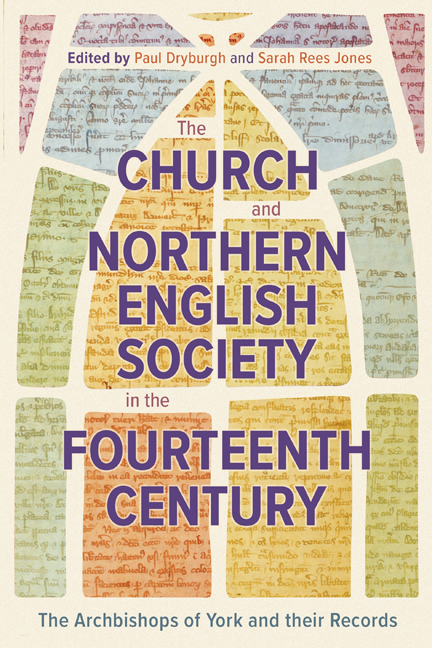 The Church and Northern English Society in the Fourteenth Century
The Church and Northern English Society in the Fourteenth Century Book contents
- Frontmatter
- Dedication
- Contents
- List of Illustrations
- List of Contributors
- Acknowledgements
- List of Abbreviations
- Map: The Ecclesiastical Province of York, c. 1304–1405
- Introduction
- 1 The Administrative Records of the Archbishops of York, 1304–1405
- 2 The Archbishops of York and the Government of Fourteenth-Century England
- 3 Support or Scourge? Archbishop William Melton and the Tradition of Loyal Opposition to the English
- 4 Beyond the Border: The Influence of York Clerks in the Two Edwards’ Scottish Administrations, 1332–1357
- 5 Responding to Royal Requirements: Clerical Taxation in the Province of York, 1304–1405
- 6 Ad insolenciam ipsius rebellis salubrius reprimendam: William Thorntoft, the Abbey of Rufford and Significations of Excommunication in the Northern Province
- 7 Blood, Sex and Holy Water: Reconciling Churches and Churchyards in the Medieval Diocese of York
- 8 Structuring Episcopal Authority: Palaces and Residences of the Archbishop of York
- 9 Medieval Parks of the Archbishops of York
- 10 Northern Ways? Pilgrimage, Politics and Piety in the Fourteenth-Century Administrative Records of the Archdiocese of York
- 11 Underexplored Sources for Gender History: New Approaches to the Fourteenth-Century York Archbishops’ Registers
- 12 Joan of Leeds and other Apostate Nuns in the Province of York, 1300–1350
- Bibliography of Records of the Archbishops of York, 1304–1405
- Index
Introduction
Published online by Cambridge University Press: 17 May 2024
- Frontmatter
- Dedication
- Contents
- List of Illustrations
- List of Contributors
- Acknowledgements
- List of Abbreviations
- Map: The Ecclesiastical Province of York, c. 1304–1405
- Introduction
- 1 The Administrative Records of the Archbishops of York, 1304–1405
- 2 The Archbishops of York and the Government of Fourteenth-Century England
- 3 Support or Scourge? Archbishop William Melton and the Tradition of Loyal Opposition to the English
- 4 Beyond the Border: The Influence of York Clerks in the Two Edwards’ Scottish Administrations, 1332–1357
- 5 Responding to Royal Requirements: Clerical Taxation in the Province of York, 1304–1405
- 6 Ad insolenciam ipsius rebellis salubrius reprimendam: William Thorntoft, the Abbey of Rufford and Significations of Excommunication in the Northern Province
- 7 Blood, Sex and Holy Water: Reconciling Churches and Churchyards in the Medieval Diocese of York
- 8 Structuring Episcopal Authority: Palaces and Residences of the Archbishop of York
- 9 Medieval Parks of the Archbishops of York
- 10 Northern Ways? Pilgrimage, Politics and Piety in the Fourteenth-Century Administrative Records of the Archdiocese of York
- 11 Underexplored Sources for Gender History: New Approaches to the Fourteenth-Century York Archbishops’ Registers
- 12 Joan of Leeds and other Apostate Nuns in the Province of York, 1300–1350
- Bibliography of Records of the Archbishops of York, 1304–1405
- Index
Summary
On 8 October 2020 Yorkshire poet Ian McMillan took to Twitter to comment, in verse, on the news that swathes of northern England were to enter Tier 3 lockdown in response to the Covid-19 pandemic:
I am The North.
I am various
I contain multitudes
Except when I am glimpsed
Through a long telescope
From The Seat of Power.
Then I am one terraced street
Where Batley
Is next door to Egremont
And I talk funny
And the cry comes:
‘Lock ‘em down, boys,
Lock ‘em down!’
McMillan, ‘the Bard of Barnsley’, neatly captures that cultural and political dissonance of long standing in England (or at least a perception thereof) between the centre, the capital, and those areas at geographical removes. In some senses, he is reaching for that ‘Grim up north’ trope beloved of playwrights and screenwriters. Principally, of course, his is a furious response to the government's perceived mishandling of the coronavirus pandemic, its lack of empathy for, and experimentation on, communities with large pockets of deprivation where the Conservative Party had made significant gains in the General Election of December 2019. It conveys a sense that the North is seen as an amorphous mass whose economy, culture and communities have again been thrown to the wolves. Since then, of course, the abandonment of the northern extension of the High Speed 2 railway into Yorkshire and Greater Manchester has driven another nail into improved connectivity between north and south and east and west. That is a far cry from the ‘Northern Powerhouse’ agenda espoused by former Conservative chancellors George Osborne and Philip Hammond that built on the civic regionalism developed under the Blair government, which itself contained many who would describe themselves as ‘northerners’, and aimed (perhaps still aims) to achieve a connected, competitive economy and transport infrastructure alongside a focus on education and skills. Ian McMillan, though, also taps into the centuries’ old debate about the place of ‘the North’ and what constitutes northernness and northern identity.
This collection of essays takes us back to a formative period for both the North and the kingdom of England as political-cultural entities: a century during which northern England was exposed to Scottish raids (causing the northern Church to mobilise material supplies, soldiers and bureaucrats), famine, epidemics (human and animal) and widespread poverty, as attested by higher rates of remission of government and papal taxation.
- Type
- Chapter
- Information
- The Church and Northern English Society in the Fourteenth CenturyThe Archbishops of York and their Records, pp. 1 - 11Publisher: Boydell & BrewerPrint publication year: 2024


